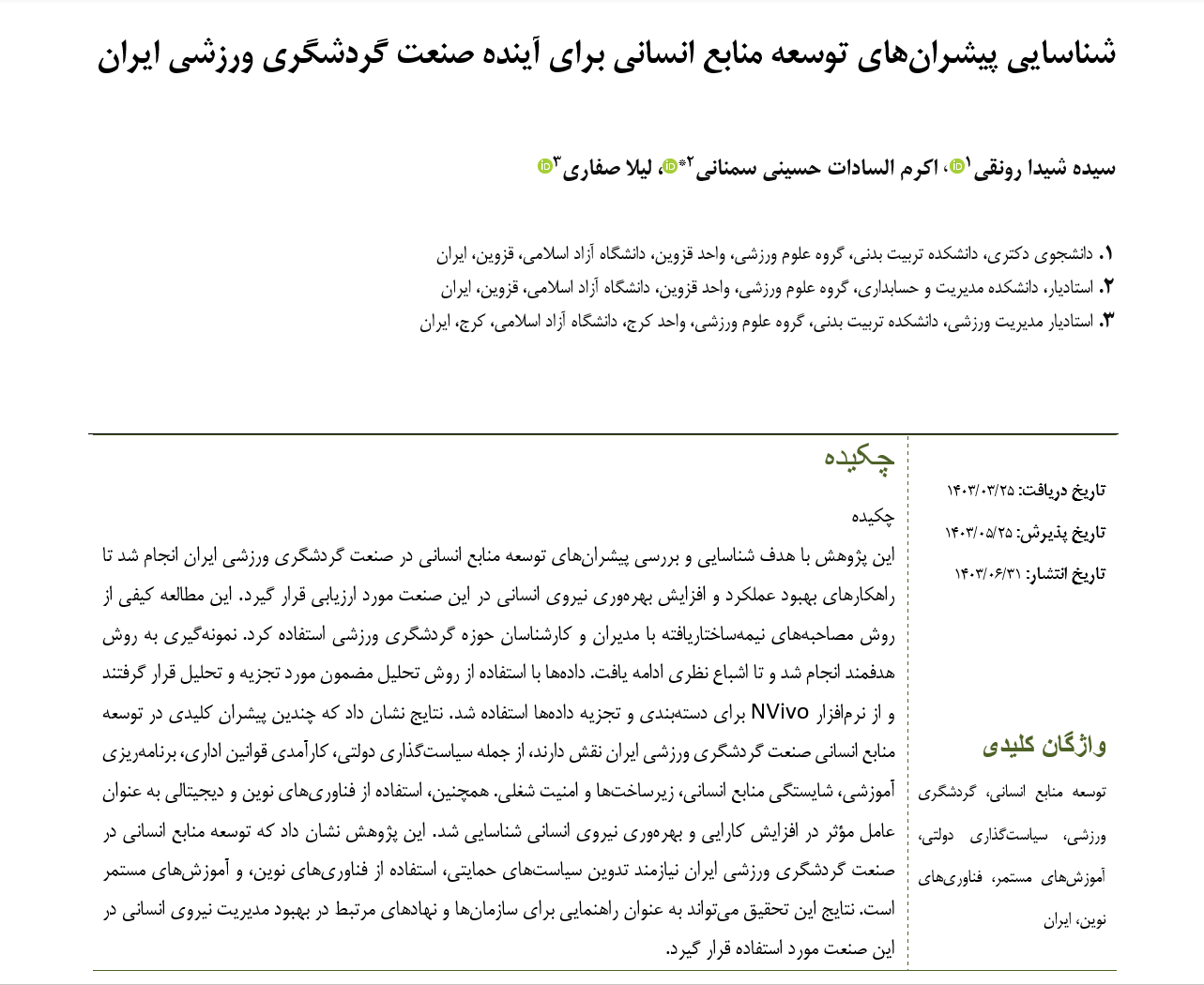Identifying the Drivers of Human Resource Development for the Future of Iran's Sports Tourism Industry
Keywords:
Human resource development, sports tourism, government policy, continuous training, modern technologiesAbstract
This study aimed to identify and investigate the drivers of human resource development in Iran’s sports tourism industry to evaluate strategies for improving performance and increasing human resource productivity in this sector. This qualitative study employed semi-structured interviews with managers and experts in the field of sports tourism. Participants were selected through purposive sampling, and interviews continued until theoretical saturation was reached. Thematic analysis was used to analyze the data, and NVivo software was utilized for data categorization and analysis. The results revealed several key drivers of human resource development in Iran’s sports tourism industry, including government policy-making, administrative regulation efficiency, educational planning, human resource competencies, infrastructure, and job security. The use of modern digital technologies was also identified as an important factor in enhancing the efficiency and productivity of human resources. This study demonstrated that human resource development in Iran’s sports tourism industry requires supportive policies, the application of modern technologies, and continuous training. The findings of this research can serve as a guide for organizations and institutions involved in improving human resource management in this sector.
Downloads
References
García MJ, Chico JR, Sánchez ARP, Sánchez JAL. A Bibliometric Analysis of Sports Tourism and Sustainability
(2002–2019). Sustainability. 2020;12(7):2840. doi: 10.3390/su12072840.
Bangun SY. The Role of Recreational Sport Toward the Development of Sport Tourism in Indonesia in Increasing
the Nations Quality of Life. Asian Social Science. 2014;10(5). doi: 10.5539/ass.v10n5p98.
Happ E. Tourism Destination Competitiveness With a Particular Focus on Sport: The Current State and a Glance Into
the Future – A Systematic Literature Analysis. Journal of Sport & Tourism. 2021;25(1):66-82. doi:
1080/14775085.2021.1888775.
Boroujerdi SS, Mansouri H, Asadi S. Developing Sports Tourism Destinations in Emerging Countries: The Case of
Zrebar Lake in Iran. Polish Journal of Sport and Tourism. 2023;30(2):22-9. doi: 10.2478/pjst-2023-0010.
Bekker S, Paliadelis P, Finch CF. The Translation of Sports Injury Prevention and Safety Promotion Knowledge:
Insights From Key Intermediary Organisations. Health Research Policy and Systems. 2017;15(1). doi: 10.1186/s12961-017-
-5.
Ferdian ME. Study on Governance of the Implementation of the Jakarta Marathon (Case Study of the 2015-2016
Implementation). JHSS (Journal of Humanities and Social Studies). 2023;7(3):880-6. doi: 10.33751/jhss.v7i3.7907.
Devine A, Boyle E, Boyd S. Towards a Theory of Collaborative Advantage for the Sports Tourism Policy Arena.
International Journal of Public Sector Management. 2011;24(1):23-41. doi: 10.1108/09513551111099208.
Al-Makhadmah IM, Ababneh SF, Alrababah KM. Challenges Facing the of Tourism Sport Activities in Jordan.
Geojournal of Tourism and Geosites. 2021;37(3):905-8. doi: 10.30892/gtg.37322-724.
Filo K, Chen N, King C, Funk DC. Sport Tourists’ Involvement With a Destination. Journal of Hospitality & Tourism
Research. 2011;37(1):100-24. doi: 10.1177/1096348011425496.
Haq EHA. Pentahelix Model in Planning Sport Tourism and Events in Hambalang Village, Bogor Regency. E-Journal
of Tourism. 2023:74. doi: 10.24922/eot.v10i1.93013.
Garidzirai R, Pasara MT. An Analysis of the Contribution of Tourism on Economic Growth in South African
Provinces: A Panel Analysis. Geojournal of Tourism and Geosites. 2020;29(2):554-64. doi: 10.30892/gtg.29214-489.
Sousa DAd, Maguire K. Towards the Development of an Innovative Sustainable Sports Tourism Management
Framework for Portugal. International Conference on Tourism Research. 2022;15(1):593-6. doi: 10.34190/ictr.15.1.375.
Rahmani N, Naderi Nasab M, Taheri M, Biniaz SA. Exploring the Future of the Sports Industry Through an Economic
Lens in 2031. International Journal of Innovation Management and Organizational Behavior (IJIMOB). 2024;4(1):170-9. doi:
61838/kman.ijimob.4.1.20.
Taheri M, Irandoust K, Ahmadi S. The effect of arginine supplementation following sleep deprivation on carbohydrate
and fat metabolism, balance and fatigue index in female athlete students. Sport Sciences and Health Research. 2021;13(1):75-
doi: 10.22059/sshr.2021.85464.
Herbold V, Thees H, Philipp J. The Host Community and Its Role in Sports Tourism—Exploring an Emerging
Research Field. Sustainability. 2020;12(24):10488. doi: 10.3390/su122410488.
Cheng J. Value and Path Optimization of Multi-Data Fusion Algorithm to Help Sports Tourism High-Quality
Development. Applied Mathematics and Nonlinear Sciences. 2023;9(1). doi: 10.2478/amns.2023.2.00947.
Liu C. Development of Sports Tourism Resources Based on Spatial Analysis Perspective. Applied Mathematics and
Nonlinear Sciences. 2023;9(1). doi: 10.2478/amns.2023.2.00974.
Li Q, Zhang D, Yu H, Xie Y. The Path Evaluation of Integrated Development of Leisure Sports and Rural Ecological
Environment in Guangxi Based on Fuzzy Comprehensive Evaluation Model. Mathematical Problems in Engineering.
;2022:1-8. doi: 10.1155/2022/5602889.
Wang Z. Research on the Development of China’s Sports Tourism Industry Based on the Background of Big Data
Era. Applied Mathematics and Nonlinear Sciences. 2023;9(1). doi: 10.2478/amns.2023.2.01688.
Liu Y. Research on the Development Path of Integration of Rural Sports Culture and Sports Tourism in the Context
of Big Data. Applied Mathematics and Nonlinear Sciences. 2023;9(1). doi: 10.2478/amns.2023.1.00150.
Tsekouropoulos G, Gkouna O, Theocharis D, Athanasios G. Innovative Sustainable Tourism Development and
Entrepreneurship Through Sports Events. Sustainability. 2022;14(8):4379. doi: 10.3390/su14084379.
Li C, Lyu S. Machine Learning-Based Classification and Evaluation of Regional Ethnic Traditional Sports Tourism
Resources. Mobile Information Systems. 2022;2022:1-9. doi: 10.1155/2022/8404931.
Soedjatmiko u. Sports Tourism Development in Indonesia. Journal of Sports Science. 2015;3(5). doi: 10.17265/2332-
/2015.08.009.
Pambudi PS, Nurhasan N, Kusnanik NW. Sustainable Sport Tourism Destination in Banyuwangi. Scholars Bulletin.
;6(7):182-8. doi: 10.36348/sb.2020.v06i07.002.
Safdel H, Yektayar M, Mohammadi S, Molazem T. Effective Factors on Sports Tourism: Emphasizing Development
in Sports Natural Attractions. Annals of Applied Sport Science. 2014;2(4):67-74. doi: 10.18869/acadpub.aassjournal.2.4.67.
Zhang Y. Information Construction of Sports Tourism in Haikou City Under the Background of Internet. Wireless
Communications and Mobile Computing. 2022;2022:1-11. doi: 10.1155/2022/6171234.

Downloads
Published
Submitted
Revised
Accepted
Issue
Section
License
Copyright (c) 2024 Journal of Study and Innovation in Education and Development

This work is licensed under a Creative Commons Attribution-NonCommercial 4.0 International License.










